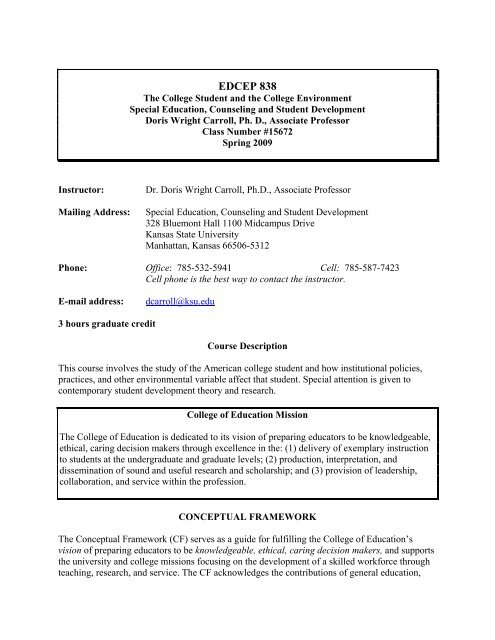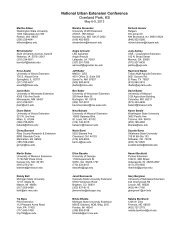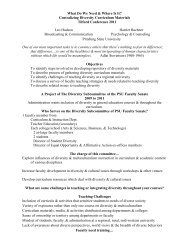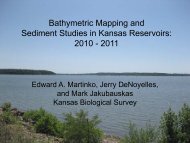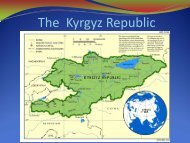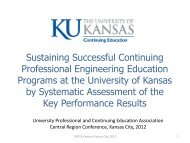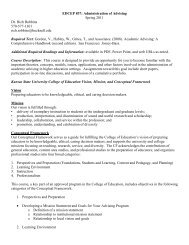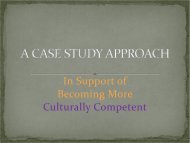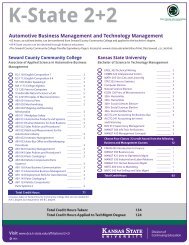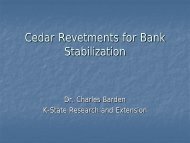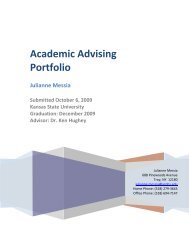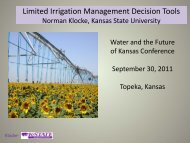EDCEP 838 - Kansas State University
EDCEP 838 - Kansas State University
EDCEP 838 - Kansas State University
You also want an ePaper? Increase the reach of your titles
YUMPU automatically turns print PDFs into web optimized ePapers that Google loves.
<strong>EDCEP</strong> <strong>838</strong><br />
The College Student and the College Environment<br />
Special Education, Counseling and Student Development<br />
Doris Wright Carroll, Ph. D., Associate Professor<br />
Class Number #15672<br />
Spring 2009<br />
Instructor:<br />
Mailing Address:<br />
Dr. Doris Wright Carroll, Ph.D., Associate Professor<br />
Special Education, Counseling and Student Development<br />
328 Bluemont Hall 1100 Midcampus Drive<br />
<strong>Kansas</strong> <strong>State</strong> <strong>University</strong><br />
Manhattan, <strong>Kansas</strong> 66506-5312<br />
Phone: Office: 785-532-5941 Cell: 785-587-7423<br />
Cell phone is the best way to contact the instructor.<br />
E-mail address:<br />
dcarroll@ksu.edu<br />
3 hours graduate credit<br />
Course Description<br />
This course involves the study of the American college student and how institutional policies,<br />
practices, and other environmental variable affect that student. Special attention is given to<br />
contemporary student development theory and research.<br />
College of Education Mission<br />
The College of Education is dedicated to its vision of preparing educators to be knowledgeable,<br />
ethical, caring decision makers through excellence in the: (1) delivery of exemplary instruction<br />
to students at the undergraduate and graduate levels; (2) production, interpretation, and<br />
dissemination of sound and useful research and scholarship; and (3) provision of leadership,<br />
collaboration, and service within the profession.<br />
CONCEPTUAL FRAMEWORK<br />
The Conceptual Framework (CF) serves as a guide for fulfilling the College of Education’s<br />
vision of preparing educators to be knowledgeable, ethical, caring decision makers, and supports<br />
the university and college missions focusing on the development of a skilled workforce through<br />
teaching, research, and service. The CF acknowledges the contributions of general education,
2<br />
content area studies, and professional studies to the preparation of educators, and organizes<br />
professional studies into four broad categories: (1) Perspectives and Preparation; (2) Learning<br />
Environment; (3) Instruction; and (4) Professionalism. This course, as a key part of an approved<br />
program in the College of Education, includes objectives in the following categories of the<br />
Conceptual Framework.<br />
Course Objectives<br />
By the completion of this course, students will be able to demonstrate knowledge in the<br />
following content areas.<br />
Perspectives and Preparation:<br />
1. Understand the developmental changes that occur during college.<br />
2. Understand how college environments and institutional settings impact students.<br />
Learning Environment:<br />
3. Use student development theories to explain students' college experiences.<br />
4. Recognize the learning styles of students in college.<br />
5. Recognize the life experiences of college students.<br />
6. Recognize how multicultural experiences impact students' learning.<br />
Instruction:<br />
7. Recognize academic learning environments for college students.<br />
Professionalism:<br />
8. Become familiar with standards of practice and ethics that guide the practice of student<br />
development work.<br />
Required Text<br />
This class will use one primary textbook. Additional readings will be used throughout this<br />
class to supplement the textook. Those readings will be listed in the syllabus and will be<br />
uploaded into the course website.<br />
Pascarella, E.T., & Terenzini, P.T. (2005). How College Affects Students. Vol. 2. A Third Decade<br />
of Research. San Francisco: Jossey Bass.<br />
Recommended Texts<br />
The following books are suggested additional reading. These texts can provide supplemental<br />
readings for this course. They are optional and were not ordered by the bookstore for specific<br />
use in this course. These books, or portions of them, are available for reading from K-<strong>State</strong>’s<br />
Hale Library through interlibrary loan.<br />
Gerald Bailey & Mike Ribble. (2007). Digital Citizenship in Schools. Washington, D.C.:<br />
International society for technology in the classroom.
3<br />
Chickering, A. & Reisser, L. (1993) Education and identity (2 nd Edition.). San Francisco:<br />
Jossey-Bass.<br />
Levine, A. & Cureton, J. (1998). When hope and fear collide. San Francisco: Jossey-Bass.<br />
Light, Richard J. (2001). Making the most of college. Students speak their minds. Cambridge,<br />
MA: Harvard <strong>University</strong> Press.<br />
Watson, L.W., Terrell, M.C., Wright, D.J. & Bonner, F. A. (2002). How Minority Students<br />
Experience College. Implications for Planning and Policy. Sterling, Virginia: Stylus.<br />
Wilson, M.E. & Wolf-Wendel, L. (Eds.) (2005). ASHE Reader on College Student Development<br />
Theory. ASHE Reader Series. Boston, MA: Pearson Custom Publishing.<br />
Additional readings/resources. The following readings are contained in your course website as<br />
PDF documents. These documents are listed in the course syllabus. Below are the full reference<br />
citations for those readings.<br />
Anderson, G., Carmichael, K., Harper, T., and Huang, Tsufang (2007) International students at<br />
four-year institutions. Developmental issues, needs, and strategies. In S. Harper & S. J.<br />
Quaye. (eds.). Student Engagement in Higher Education. Theoretical Perspectives and<br />
Practical Approaches for diverse populations (pp. 1-15) New York and London: Routledge.<br />
Harper, S. R. & Quaye, S. J. (2007). Beyond sameness, with engagement and outcomes for all.<br />
In S. Harper & S. J. Quaye. (eds.). Student Engagement in Higher Education. Theoretical<br />
Perspectives and Practical Approaches for diverse populations (pp. 1-15) New York and<br />
London: Routledge.<br />
McEwen, M. (2005). The nature and uses of theory. In M.E. Wilson, & L. Wolf-Wendel (Eds.)<br />
ASHE Reader on College Student Development Theory (pp. 5-24). ASHE Reader Series.<br />
Boston, MA: Pearson Custom Publishing.<br />
Strange, C. (2005) Student Development: the Evolution and Status of an Essential Idea. In M.E.<br />
Wilson, & L. Wolf-Wendel (Eds.) ASHE Reader on College Student Development Theory<br />
(pp. 25-42). ASHE Reader Series. Boston, MA: Pearson Custom Publishing.<br />
Organization of class activities<br />
This course has a large enrollment and it creates some challenges for promoting student<br />
interaction. For this reason, class members will be assigned to smaller student groups ranging in<br />
size from 8-10 students. Five students groups are created. At the time you begin this class, the<br />
instructor will assign students randomly to these five groups. Students should look for details<br />
regarding the group assignment in the daily course announcements section of the class website.<br />
Online Class Exercises and Discussion
4<br />
Knowledge is shared and information is disseminated using on-line learning exercises and open<br />
discussion throughout this class. Class participation is a key learning component in this class. For<br />
this reason, students are expected to participate in all on-line activities and discussions.<br />
Class participation involves two essential elements: a) posting your responses, reactions, and<br />
critical analysis to assigned readings; and b) asking and responding to questions that prompt<br />
further discussion regarding the day’s topic. The quality and quantity of your participation is<br />
used in determining your class grade.<br />
Online discussion and participation are assessed in determining your class grade. Three<br />
assessment rubrics are used to determine online participation, expression, and content. Each of<br />
these criteria is awarded a maximum of 100 points each. The criteria for such assessment are<br />
presented later in this syllabus beginning on page four.<br />
Digital Citizenship. Digital citizenship involves the norms of behavior with regard to<br />
technology use (Bailey, Ribble, and Ross, 2004). In this course, digital citizenship is considered<br />
an important professional skill. Students are expected to practice this skill during their<br />
interactions with students in class online. Nine key behavioral elements combine to make up<br />
Digital citizenship. They include the following.<br />
1. Etiquette. Electronic standards of conduct.<br />
2. Communication. Electronic exchange of information.<br />
3. Education. The process of teaching and learning about technology and the use of<br />
technology.<br />
4. Access. Full electronic participation in society.<br />
5. Commerce. Electronic buying and selling of goods.<br />
6. Responsibility. Electronic responsibility for actions and deeds<br />
7. Rights. Those freedoms extended to everyone in a digital world.<br />
8. Safety. Physical [and psychological] well being in a digital technology world.<br />
9. Security [self-protection]. Electronic precautions to guarantee safety.<br />
Digital Citizenship is awarded 50 points.<br />
Extra Credit. Students can earn extra credit points for a variety of professional development and<br />
community activities that are related to our course topic. Such activities include presentations at<br />
local, regional, or national conferences, attendance at such professional development workshops,<br />
and civic activities such as voting in upcoming local, state, or national election. Students can<br />
earn from 5-10 points per extra credit event, up to a maximum of 50 points.<br />
Grading and Assessment of Learning<br />
Students’ grades for this course are determined based on the activities that are listed below.<br />
Aside each activity is a number point total awarded each learning assignment.<br />
On-Line content 100<br />
Online expression 100<br />
Online participation 100
5<br />
Exams (5)@ 50 pts. Ea. 250<br />
Digital citizenship 50<br />
__________________________________<br />
TOTAL POINTS 600<br />
Extra credit points are added to a student’s total score at the end of the semester.<br />
Grading A = 550- 600<br />
B = 525-549<br />
C = 500-524<br />
Course Requirements<br />
Required course activities are described below. Each activity or event is described briefly below.<br />
During the course, additional information regarding each course requirement will be posted for<br />
the class.<br />
Exams. There are five (5) quizzes, each worth 50 points each for a total of 250 points. The<br />
class quizzes are administered on-line through K-<strong>State</strong> Online. Each quiz is located in the course<br />
website. Details and instructions, including a time line for completing the exam, are presented<br />
within the body of the actual exam. The content areas for each exam will be outlined in class<br />
lectures and posted in the course announcements.<br />
Class participation. Participation includes the number or frequency of posted comments,<br />
questions, and reactions. Students are expected to participate fully in class activities. Students<br />
are expected to post weekly a minimum of two (2) comments each week. One is your own<br />
reaction regarding the assigned readings. The second one is your response to one class member.<br />
The postings can take the form of comments, questions, and reactions regarding (a) assigned<br />
readings and (b) class members’ posted comments. Three participation rubrics for assessing<br />
your participation are described below.<br />
Criteria for Assessing Participation<br />
During this class, online discussion and participation will be assessed using three elements:<br />
content, expression, and participation. These elements are adapted from the work of Bauer &<br />
Anderson (2000) and involve the use of rubrics for assessing participation.<br />
Rubric for Online Content Assessment<br />
Content includes the degree to which students acquire an understanding of the essential material<br />
presented within the course. Additionally, this content rubric evaluates the degree to which a<br />
student can apply this material to practical situation and show an ability to analyze the content<br />
[critical thinking]. 100 points are awarded to this activity.<br />
Points<br />
Skills
6<br />
90-100 Demonstrates excellence in grasping key student development concepts; shows ability<br />
to apply these concepts to college environment settings; can apply these concepts<br />
during case analysis; provides strong evidence about the application of student<br />
development concepts; readily offers new interpretations on student development<br />
discussion materials.<br />
80-89 Shows evidence of understanding most of the major student development concepts;<br />
can agree or disagree with ideas when asked; shows skill in formulating and stating<br />
opinions; offers an occasion divergent opinion about multicultural concepts.<br />
70-79 Has a shallow grasp of course material; rarely takes a stand on discussion issues;<br />
offers inadequate levels of support for opinions. Shows little application of concepts<br />
and ideas to advising.<br />
60-69 Shows little to no significant understanding of course material; make few comments<br />
about discussion issues; offers a weak support for opinions.<br />
50-59 Shows no understanding of the course material. Shows naiveté or ignorance regarding<br />
multicultural concepts. Postings are infrequent and present a narrow worldview about<br />
multicultural groups.<br />
Rubric for Assessing Online Participation<br />
Online Participation includes the number or frequency of online postings to case analysis, daily<br />
assignments, discussion or bulletin boards, and so forth. Students must make a minimum of<br />
one posting and respond critically to one class member each week. 100 points are awarded<br />
to this activity.<br />
Points<br />
Skills<br />
90-100 Contributions are immediate, prompt, timely, relevant, and self-initiated; comments<br />
and reactions are posted freely on all assignments throughout the entire course. There<br />
is no attempt to dominate the discussion; applies digital citizenship principles in all<br />
discussion. Shows strong evidence of respect for divergent opinions.<br />
80-89 Contributions are self-initiated. Comments and reactions are posted but not in a timely<br />
way. Student follows discussion and responds during discussion. Engages in some<br />
critical thinking and challenges others interpretation of the readings and research.<br />
Applies digital citizenship principles in most discussions.<br />
70-79 Student keeps up with the discussion; needs an occasion prompting to contribute;<br />
participates in some conversations or discussions more than others. Show minimal<br />
evidence of respect for divergent opinions; shows minimal evidence of digital<br />
citizenship principles in most discussion
7<br />
60-69 Participation is spotty; picks and choose topics in which to get involved; does<br />
perfunctory postings when prompted; take little initiative in posting information;<br />
shows little evidence of digital citizenship; Shows little evidence of respect for<br />
divergent opinions.<br />
50-59 Student rarely participates freely; makes short, irrelevant remarks; shows no evidence<br />
of digital citizenship; shows no evidence of respect for divergent opinions.<br />
< 50 Unacceptable participation. Failing.<br />
Rubric for Assessing Online Expression<br />
Expression involves two components: 1) formal postings, assignments, and projects and (2)<br />
online discussion. In general, expression can provide a degree of clarity to content (Bauer &<br />
Anderson, 2000). Great ideas are lost if they are not expressed well. Bean & Peterson (1998)<br />
note that good writing is tied closely with good scholarship. In this assessment rubric, writing<br />
style, grammar, and language are an important criteria. Students are encouraged to use<br />
appropriate grammar when composing comments for posting or when preparing formal postings<br />
such as projects and assignments. 100 points are awarded to this activity.<br />
Points<br />
Skills<br />
91-100 Uses complex, grammatically correct sentences on a regular basis; expresses ideas and<br />
Student development concepts clearly, concisely, and cogently in a logical manner;<br />
uses words and phrases that demonstrate a high level of vocabulary; has very few<br />
misspellings.<br />
81-90 Sentences are grammatically correct; ideas are readily understood. Student<br />
development ideas and concepts are presented globally in a logical manner. Some<br />
misspellings and confusing phrases.<br />
71-80 Sentences are grammatically correct; ideas are readily understood but show<br />
disorganization; some transitions between concepts are missing; there are occasional<br />
misspellings.<br />
61-70 Shows poor use of language confuses and garbles much of the message. Presents only<br />
an occasional student development idea; language is disjointed. There is an overuse of<br />
the simple sentence and repetition of words; paragraphs are often unrelated to one<br />
other.<br />
51-60 Writing is largely intelligible. There are incomplete sentences and frequent<br />
misspellings. There is a poor organization to paragraphs and to ideas presented therein.<br />
< 50 Not acceptable; failing.
8<br />
Rubric is modified from Bauer, J.F & Anderson, and R. S. (2000). Evaluating students’ written performance in the<br />
online classroom. In R. Weiss, D.S. Knowlton, & B.W. Speck (Eds). Principles of Effective Teaching in the Online<br />
Classroom. New Directions for Teaching and Learning, 84 (winter). San Francisco, CA: Jossey-Bass, 65-71.<br />
Accommodations for Disabled Students. Students with disabilities include those having<br />
mobility impairments, visual and hearing impairments, chronic diseases, and learning<br />
disabilities. Such disabilities make it difficult for students to carry out the course work and<br />
require accommodations. Students with disabilities should notify Dr. Carroll immediately. Each<br />
student is responsible for identifying himself or herself and making the accommodation request.<br />
The Office of Disabled Student Services (DSS) helps KSU students with documented disabilities<br />
and will assist with academic classroom accommodations, including online accommodations.<br />
The director, Andrea Blair, can be contacted by phoning 785-532-6441 or via e-mail at<br />
dss@ksu.edu. Students must meet DSS eligibility guidelines for services before requesting<br />
accommodations.<br />
<strong>State</strong>ment Regarding Academic Honesty. <strong>Kansas</strong> <strong>State</strong> <strong>University</strong> has an Honor and Integrity<br />
System based on personal integrity, which is presumed to be sufficient assurance in academic<br />
matters one’s work is performed honestly and without unauthorized assistance. All students, by<br />
their registration, acknowledge the jurisdiction of the Honor and Integrity System. The policies<br />
and procedures of the Honor and Integrity System apply to all full and part-time students<br />
enrolled in undergraduate and graduate courses on-campus, off-campus, and via distance<br />
learning.<br />
A component vital to the Honor and Integrity System is the inclusion of the Honor Pledge, which<br />
applies to all assignments, examinations, or other course work undertaken by students. The<br />
Honor Pledge is implied, whether or not it is stated:<br />
“On my honor, as a student, I have neither given nor received unauthorized aid on this<br />
academic work.” A grade of XF can result from a breach of academic honesty. The F<br />
indicates failure in the course; the X indicates the reason is an Honor Pledge violation.<br />
Students are invited to visit the Honor & Integrity System website at: http://www.ksu.edu/honor/<br />
to learn about the Honor & Integrity System and their obligations and duties for academic<br />
integrity. Students are requested to discuss any academic integrity concerns with the instructor<br />
first before filing a formal complaint with the Honor & Integrity System.<br />
Syllabus Campus Safety <strong>State</strong>ment. <strong>Kansas</strong> <strong>State</strong> <strong>University</strong> is committed to providing a safe<br />
teaching and learning environment for students and faculty members. In order to enhance<br />
your safety in the unlikely case of a campus emergency make sure that you know where and<br />
how to quickly exit your classroom and how to follow any emergency directives. To view<br />
additional campus emergency information go to the <strong>University</strong>’s main page, www.k-state.edu,<br />
and click on the Emergency Information button.<br />
Copyright Information. Doris Wright Carroll, Ph.D., Associate Professor, holds the copyright<br />
for all <strong>EDCEP</strong> <strong>838</strong> course materials except where specifically indicated. This copyright pertains
9<br />
to the syllabus, lectures, notes and lecture materials developed in all format including electronic,<br />
written, oral and print communication.<br />
Privacy and On-line Communication. Electronic communication for classroom learning may<br />
be considered public communication and subject to review by a third party, according to<br />
university electronic and technology polities. For this reason, electronic communication in this<br />
class is not confidential. Students are advised to exercise care and responsibility when they<br />
communicate on-line. For additional information concerning electronic communication, students<br />
are advised to review KSU’s Electronic mail Policy http://www.kstate.edu/academicservices/docs/email.html<br />
and the Information Technology Usage Policy found<br />
at: http://www.ksu.edu/academicservices/docs/usage.html.<br />
Technology Requirements. Students must have access to a computer with Internet and web<br />
access. Students should be able to access and review course assignments on line. Computer<br />
memory must be sufficient so that the students can send and receive messages and use web<br />
resources. For computer specifications, students are encouraged to contact the College of<br />
Education Catalyst Technology Center at 785-532-5926 or iTAC Help Desk at 785-532-7722.<br />
K-<strong>State</strong> Online [KSOL]. All class materials and supplemental resources are located in the<br />
course website. Students will use K-<strong>State</strong> Online to take their class exams. The iTAC Help desk<br />
is available for your assistance in learning about KSOL. Check the KSOL website for a tutorial<br />
and training. A link is located on the KSOL main webpage at http://public.online.ksu.edu/.
10<br />
<strong>EDCEP</strong> <strong>838</strong> The College Student and the College Environment<br />
Doris Wright Carroll, Ph.D., Associate Professor<br />
Topical Readings and Assignments<br />
Spring 2009<br />
A schedule of readings, exams, and assignments is presented below. This schedule is subject to change depending<br />
upon the learning needs of the class.<br />
DATE TOPIC READING ASSIGNMENT<br />
Key P & T = Pascarella & Terenzini<br />
Week 1 Introduction and Course Overview<br />
Jan15-24 Orientation/syllabus quiz is released Jan. 20<br />
College Outcomes Research P & T Ch. 1<br />
Jan. 19 Martin Luther King, Jr. Holiday No class assignment<br />
Module 1<br />
Week 2 Theories and Models of Student Change P & T Ch. 2<br />
Jan 26-31 Chickering, psychosocial, and identity development<br />
theories are emphasized this week<br />
McEwen, M. The nature and uses of theory. PDF<br />
Strange, C. Student Development: the Evolution and Status of an Essential Idea.<br />
(Combined together in one PDF in module 1 course files.<br />
Week 3 Theories and Models of Student Change P & T Ch. 2<br />
Feb 2-7 Cognitive and intellectual development theories<br />
College impact models are emphasized this week<br />
EXAM 1<br />
Module 2<br />
Week 4 Attitudes and values of college students P & T Ch. 6<br />
Feb 9-14 Change during college<br />
Net effects of college<br />
Week 5 Attitudes and values of college students P & T Ch. 6<br />
Feb 16-21 Long term effects<br />
Within college effects<br />
Week 6 Psychosocial change P & T Ch. 5<br />
Feb 23-28 EXAM #2<br />
Module 3<br />
Week 5 Verbal, quantitative, & Academic Competence P & T Ch. 3<br />
Mar 2-7
11<br />
Week 6 Moral development P & T Ch. 7<br />
Mar 9-14<br />
Week 7<br />
Mar 16-21<br />
SPRING BREAK –NO ASSIGNMENTS<br />
Week 8 Educational Attainment and persistence P & T Ch. 8<br />
Mar 23-29 Harper, S. R. & Quaye, S. J. (2007). Beyond sameness, with engagement and<br />
outcomes for all. PDF located in Module 3.<br />
EXAM # 3<br />
Module 4<br />
Week 9 Cognitive Skills and Intellectual Growth P & T Ch. 4<br />
Mar 30-Apr 4<br />
Week 10 Quality of life after college P & T Ch. 10<br />
Apr 6-11<br />
Week 11 Career and Economic impacts of College P & T Ch. 9<br />
Apr 13-18 Quiz #4<br />
Module 5<br />
Week 12<br />
Apr. 20-25<br />
Engagement with diverse populations: International Students<br />
International students at four-year institutions. Developmental issues, needs, and<br />
strategies. Anderson, G., Carmichael, K., Harper, T., and Huang, Tsufang PDF<br />
(Located in Module 5)<br />
Week 13 Implications for Research, Practice, and Policy P & T Ch. 12<br />
Apr 27-May 2<br />
Week 14 How college affects students: A summary P & T Ch. 11<br />
May 4-8 Course evaluation is released.<br />
Quiz #5<br />
Week 15<br />
May 11-16<br />
Final Week<br />
Copyright 2009. Doris Wright Carroll, Associate Professor, <strong>Kansas</strong> <strong>State</strong> <strong>University</strong>. This copyright pertains all<br />
lectures materials, notes, examinations, and other course materials as presented in electronic, oral, and written<br />
format unless otherwise indicated.<br />
1/13/2009<br />
dwc


